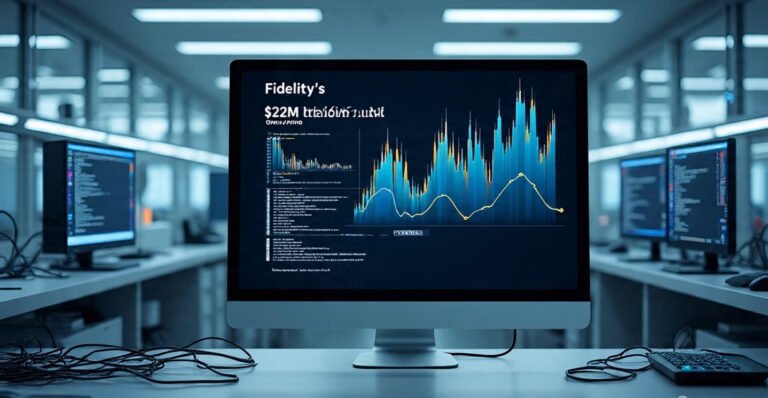The financial world is witnessing a revolutionary transformation as traditional investment giants embrace blockchain technology and decentralized finance (DeFi). In a groundbreaking move that signals the mainstream adoption of tokenized assets, Fidelity Investments has successfully launched its tokenized money market fund on the Ethereum via Ondo blockchain, with Ondo Finance managing an impressive Fidelity’s $202M in assets. This historic development represents a significant milestone in the convergence of traditional finance and blockchain innovation, demonstrating how established financial institutions are leveraging cryptocurrency infrastructure to enhance their service offerings.
The collaboration between Fidelity, one of America’s largest asset managers with over $4.5 trillion in assets under management, and Ondo Finance, a leading DeFi protocol specializing in institutional-grade tokenized products, marks a pivotal moment in the digital asset ecosystem. This partnership not only validates the maturity of blockchain-based financial products but also opens new avenues for investors seeking exposure to both traditional money market instruments and the efficiency of smart contract technology.
The $202 million milestone achieved by this tokenized money market fund underscores the growing institutional confidence in blockchain-based investment vehicles. As regulatory frameworks continue to evolve and traditional financial institutions recognize the benefits of tokenization, this partnership serves as a blueprint for future collaborations between established financial giants and innovative DeFi platforms.
Understanding Fidelity’s Tokenized Money Market Fund
What Makes This Fund Revolutionary
Fidelity’s tokenized money market fund represents a paradigm shift in how traditional financial products are structured and delivered. Unlike conventional money market funds that rely on traditional banking infrastructure, this innovative product leverages Ethereum’s Blockchain to provide enhanced transparency, efficiency, and accessibility to investors.
The fund operates by converting traditional money market instruments into digital tokens that exist on the Ethereum network. These tokens represent ownership stakes in underlying assets such as Treasury bills, commercial paper, and certificates of deposit. By utilizing smart contracts, the fund can automate various operational processes, reducing costs and improving settlement times significantly.
Technical Infrastructure and Smart Contract Integration
The technical foundation of this tokenized money market fund relies on sophisticated smart contract architecture built on the Ethereum blockchain. These contracts handle critical functions including token issuance, redemption processes, yield distribution, and compliance monitoring. The blockchain-based system ensures that all transactions are recorded immutably, providing unprecedented transparency for fund operations.
Ondo Finance has developed a robust infrastructure that bridges traditional finance with DeFi protocols, enabling institutional investors to access money market exposure while benefiting from blockchain efficiency. The platform’s architecture includes advanced security measures, multi-signature wallets, and comprehensive audit trails that meet institutional-grade requirements.
Ondo Finance: The DeFi Bridge to Traditional Assets
Ondo’s Role in Institutional DeFi
Ondo Finance has emerged as a pioneering force in bringing traditional financial products to the decentralized finance ecosystem. The platform specializes in creating tokenized versions of conventional investment instruments, making them accessible to DeFi users while maintaining the regulatory compliance and risk profiles that institutional investors require.
With the $202 million in assets under management for Fidelity’s tokenized fund, Ondo demonstrates its capability to handle substantial institutional flows while maintaining the security and operational standards expected by traditional finance participants. The platform’s approach to tokenization focuses on creating seamless bridges between traditional assets and blockchain technology.
Technology Stack and Security Measures
Ondo’s technology infrastructure incorporates multiple layers of security and compliance monitoring. The platform utilizes multi-signature wallets, time-locked contracts, and comprehensive audit mechanisms to ensure fund security. Additionally, the system includes KYC/AML compliance tools that enable institutional participation while maintaining regulatory adherence.
The platform’s smart contract architecture has undergone extensive auditing by leading blockchain security firms, ensuring that the tokenized money market fund operates with institutional-grade security standards. This technological foundation enables Fidelity to offer its clients exposure to digital assets while maintaining the risk management protocols expected in traditional finance.
Market Impact and Industry Implications
Traditional Finance Embracing Blockchain Technology
Fidelity’s entry into tokenized assets through this Ethereum-based money market fund signals a broader trend of traditional financial institutions recognizing the transformative potential of blockchain technology. This development represents more than just a product launch; it demonstrates how established players are adapting their business models to incorporate DeFi innovations.
The $202 million milestone achieved in partnership with Ondo Finance validates the market demand for tokenized financial products that combine the stability of traditional assets with the efficiency of blockchain infrastructure. This success story is likely to encourage other major financial institutions to explore similar partnerships with DeFi protocols.
Regulatory Landscape and Compliance
The successful launch of this tokenized money market fund also highlights the evolving regulatory environment surrounding digital assets and blockchain-based financial products. Fidelity’s ability to navigate compliance requirements while leveraging Ethereum’s blockchain demonstrates that regulatory frameworks are becoming more accommodating to innovative financial structures.
The fund’s structure incorporates comprehensive compliance mechanisms, including investor verification, transaction monitoring, and regulatory reporting capabilities. This approach ensures that the tokenized money market fund meets all applicable regulatory standards while providing the benefits of blockchain technology.
Investment Benefits and Performance Metrics
 Enhanced Liquidity and Transparency
Enhanced Liquidity and Transparency
One of the primary advantages of Fidelity’s tokenized money market fund is the enhanced liquidity it provides to investors. Traditional money market funds often have settlement delays and limited trading hours, but the blockchain-based structure enables 24/7 accessibility and faster transaction processing.
The Ethereum blockchain provides complete transparency regarding fund holdings, transactions, and performance metrics. Investors can verify fund operations through blockchain explorers, creating an unprecedented level of transparency in money market investing. This transparency, combined with the $202 million in managed assets, demonstrates strong investor confidence in the product.
Cost Efficiency and Operational Advantages
Smart contract automation significantly reduces operational costs compared to traditional money market funds. Manual processes such as dividend distributions, compliance monitoring, and settlement procedures are automated through blockchain technology, resulting in lower expense ratios for investors.
Ondo Finance’s efficient infrastructure enables Fidelity to offer competitive yields while maintaining lower operational costs. The platform’s DeFi integration also opens opportunities for additional yield generation through carefully managed blockchain-based strategies.
Future Outlook and Market Expansion
Scaling Opportunities and Product Development
The success of this tokenized money market fund, evidenced by the $202 million in assets under management, creates a foundation for expanding Fidelity’s blockchain-based product offerings. The company is well-positioned to launch additional tokenized assets across various asset classes, potentially including tokenized bonds, equity funds, and alternative investments.
Ondo Finance’s proven ability to manage institutional-grade DeFi products positions the platform as a key partner for future product developments. The partnership’s success may lead to expanded collaboration, potentially encompassing a broader range of tokenized financial instruments.
Industry Adoption and Competitive Landscape
As Fidelity demonstrates the viability of tokenized money market funds through this successful partnership with Ondo Finance, other major financial institutions are likely to accelerate their own blockchain initiatives. The $202 million milestone serves as proof of concept that may trigger broader industry adoption of tokenized assets.
The competitive landscape is evolving rapidly as traditional finance companies recognize the need to integrate DeFi capabilities into their service offerings. This trend suggests that tokenized financial products will become increasingly mainstream, potentially transforming the entire asset management industry.
Risk Considerations and Investment Guidelines
 Technology and Smart Contract Risks
Technology and Smart Contract Risks
While Fidelity’s tokenized money market fund offers numerous advantages, investors should understand the associated risks. Smart contract vulnerabilities, though minimized through extensive auditing, represent a technological risk not present in traditional money market funds. Ondo Finance has implemented comprehensive security measures, but the inherent risks of blockchain technology should be considered.
The fund’s reliance on Ethereum’s blockchain also introduces risks related to network congestion, gas fees, and potential protocol upgrades. However, the $202 million in successfully managed assets demonstrates the platform’s resilience and operational stability.
Regulatory and Market Risks
The evolving regulatory landscape for digital assets and tokenized securities presents ongoing considerations for investors. While current regulations support the fund’s structure, future regulatory changes could impact operations or accessibility.
Market risks associated with underlying money market instruments remain consistent with traditional funds, though the blockchain-based structure may introduce additional volatility during periods of cryptocurrency market stress.
Conclusion
Fidelity’s partnership with Ondo Finance to launch a tokenized money market fund on the Ethereum blockchain, achieving $202 million in assets under management, represents a watershed moment in the convergence of traditional finance and decentralized finance. This groundbreaking initiative demonstrates how established financial institutions can successfully leverage blockchain technology to enhance their product offerings while maintaining the security and compliance standards expected by institutional investors.
The success of this tokenized money market fund validates the growing maturity of DeFi infrastructure and its ability to support institutional-grade financial products. As the $202 million milestone indicates, there is substantial market demand for tokenized assets that combine traditional investment characteristics with blockchain efficiency and transparency.
This partnership between Fidelity and Ondo Finance is likely to catalyze broader industry adoption of tokenized financial products. As regulatory frameworks continue to evolve and blockchain technology matures, we can expect to see more traditional financial institutions exploring similar collaborations with DeFi platforms.
The implications of this development extend far beyond a single product launch. It signals a fundamental shift in how financial services may be delivered in the future, with blockchain technology serving as the infrastructure for more efficient, transparent, and accessible investment products. As this trend continues, investors and financial institutions alike must adapt to a rapidly changing landscape where traditional finance and decentralized finance increasingly converge.

